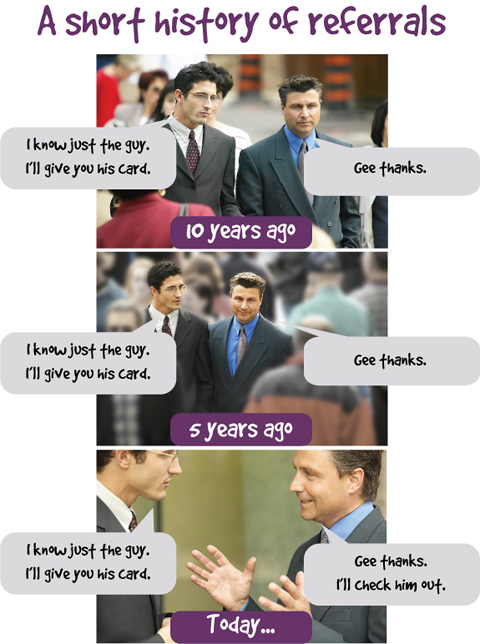The Four-Word Referrals Revolution

“I’ll check them out…”
It’s a big red flag.
If you’ve been comfortably resting on referrals and word-of-mouth as your source of new business, you should hear the alarm bell ringing: the rules changed.
No matter how much you trust and respect the person who gives referrals to a product or service, you will, out of curiosity more than skepticism, feel the need to put that name into Google, then make judgments on what appears … or fails to appear. You do it, we do it, the whole world is doing it. Your best prospects are no different. All buyers feel empowered to find their own resources. All buyers believe they have the information and the skills to make sound choices. That confidence, combined with the ability to screen out “selling” messages, means that
… buyers are now in charge of transactions.
All transactions. From choosing where to order pizza delivery to comparing new car models to relocating a Fortune 500 headquarters – whether it’s an early-stage search for vendors, or an “I’ll check ‘em
out” verification/authentication process – if you fail to get into the selection set, you will fail to make the sale. The ability to “push” a sales message gets more expensive, less practical, and less effective every year. TV? Foiled by digital recording and fragmented media. Radio? Foiled by iPods. Phone calling? Foiled by voice mail. Direct mail? Less responsive year by year. Yellow Pages (the living dead of media)? Nobody under 70 is in the habit any more … and even if they were, there your ad would be, surrounded by all your competitors, begging for a round of price-comparison phone calls.
What’s a brand to do?
First, don’t sit still, doing the same old same old. Rethink your assumptions about where your business comes from and where you might be losing opportunities by the bushel. If you believe (as, for instance, most professional service firms believe) that your business depends on referrals, think twice about how those get validated, how potential clients (and recruits!) “check you out.” If they Google your name, do you appear professional, stable, resourceful, up to date … all the attributes a prospect might desire? If they simply Google your category (and they will), do you even appear? If not, you have a findability problem which can be every bit as fatal as a designed-by-somebody’s-nephew, 2002-era website.
Findability is a huge issue. When people search your category, do you show up ahead of your competition? Don’t bother searching for your name (only your Mom will do that) … search the words that describe how you are differentiated in your category, the way prospects search. If you make widgets, but are really good at left-handed widgets, search “left-handed widgets.” What competitors rank higher than you?
So, here’s the key question:
How findable are you? Begin by investing in a Website Analysis Report of your current website, a report using our proprietary techniques and tools; we’ll help you analyze and quantify your findability, and compare the results versus your competitors. Set that benchmark and you can begin to measure progress from there.